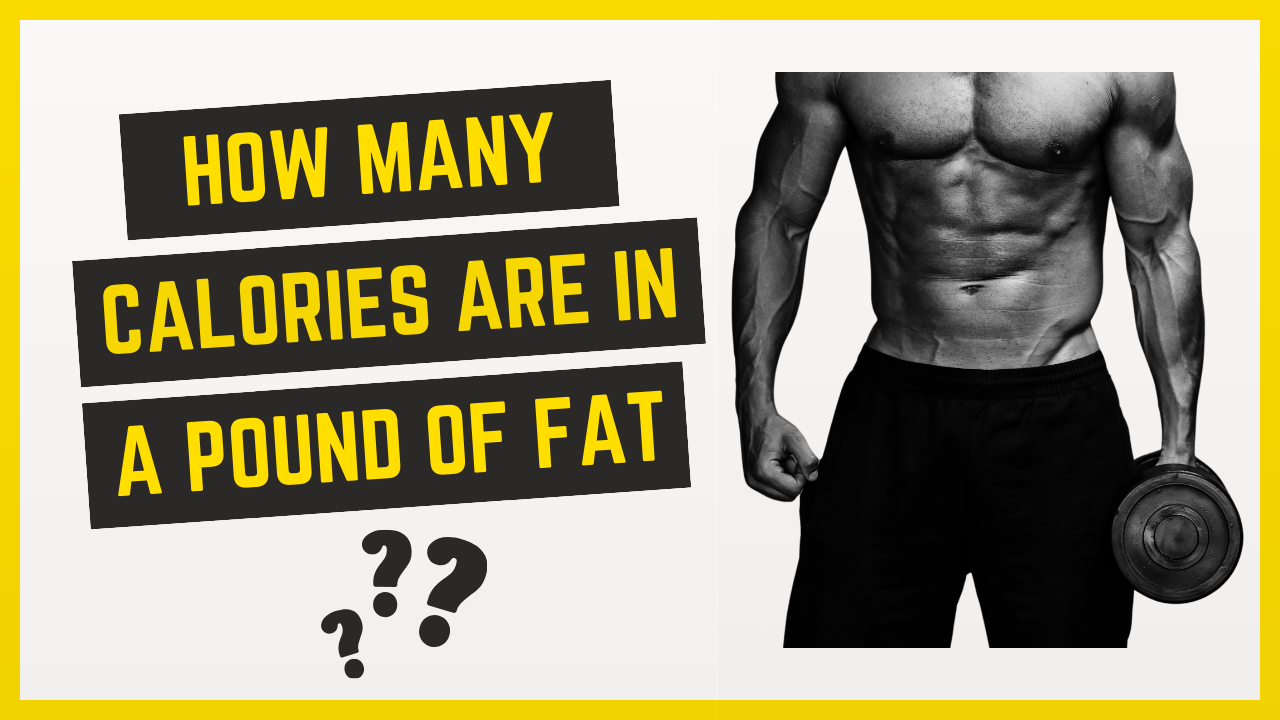
Are there roughly 3,500 calories in one pound of fat?
Yes…
But the reason I say “roughly” is because things are a little more complicated than that.
Don’t worry, by the time you’re done reading this article you’ll know where the 3,500 number comes from and why it’s not necessarily so black-and-white when it comes to weight loss/weight gain.
How many calories does it take to burn one pound of fat?
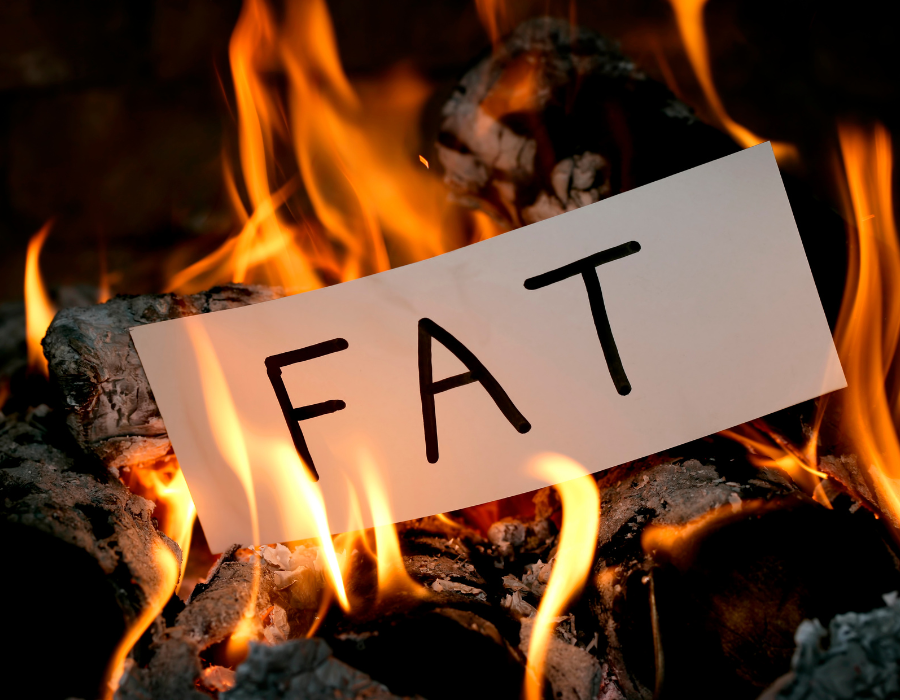
From a purely fat storage perspective, because science says that there are 3,500 calories in a pound of stored body fat.
Let’s say you have a deficit of 500 calories per day (which is 3,500 calories for the week).
So you can expect to lose exactly one pound then, right?
And a 3,500 calorie surplus means gaining exactly one pound, correct?
Not quite…
It’s important to understand the energy balance equation
Basically, this is the whole “calories in vs. calories out thing.”
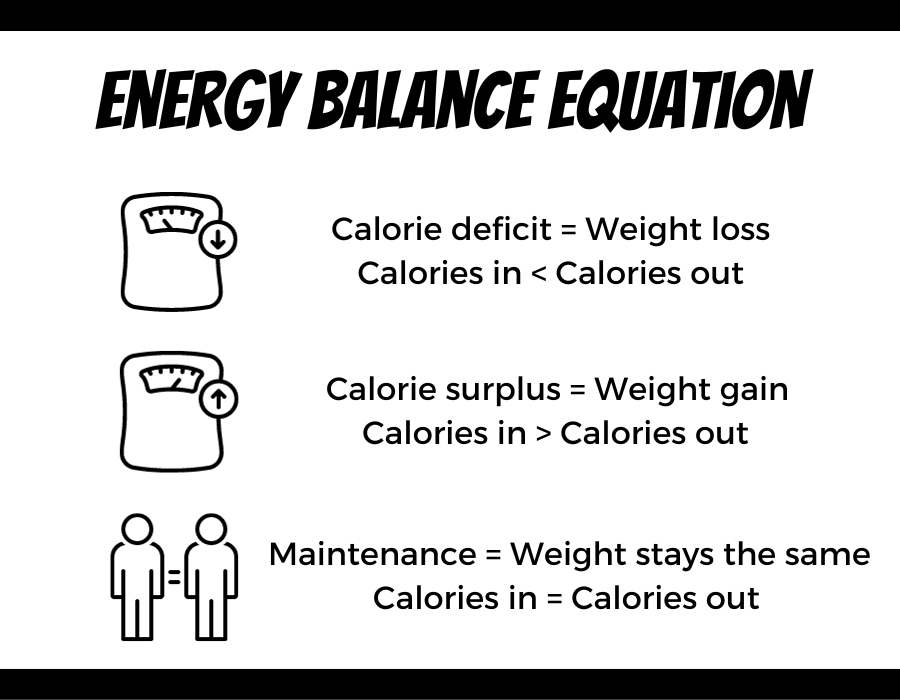
If you consume fewer calories than you burn, that puts you in a negative energy balance and you’ll lose weight (calorie deficit).
On the other side, taking in more calories than you burn means you’ll gain weight (calorie surplus).
And then when you consume the same number of calories you burn, it keeps your weight the same.
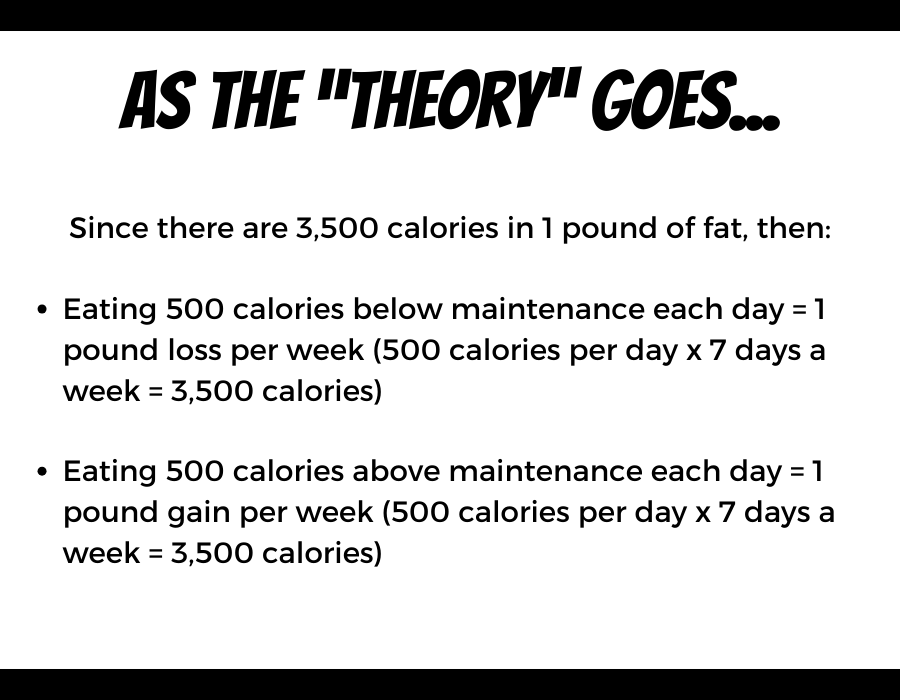
Let’s say someone’s maintenance calories are 3,000.
In theory, that would mean:
- Eating 2,500 calories per day would put them in a deficit and they’d lose one pound per week (500 calories below maintenance x 7 days a week = 3,500 calories, or one pound lost)
- Eating 3,500 calories per day would put them in a surplus and they’d gain one pound per week (500 calories above maintenance x 7 days a week = 3,500 calories, or one pound gained)
- Eating 3,000 calories (so right at maintenance) would allow them to maintain their current weight.
In a nutshell, the whole 3,500 calories in a pound of fat thing is built on the premise that:
A.) Eating 3,500 calories below maintenance = EXACTLY one pound of weight loss per week.
B.) Eating 3,500 calories above maintenance = EXACTLY one pound of weight gain per week.
Here’s the kicker, you can’t just use a straight math equation here.
It’s not as simple as 2+2 = 4.
A little lost?
No worries!
Keep reading, I’ll explain everything below.
Issue #1: You’re not taking into account how your body reacts to the calories you consume
We’ll look at things from both a weight loss and weight gain perspective.
But let’s start with the weight loss side first.

Weight loss viewpoint
You’re consuming 3,500 calories below maintenance, so as the theory goes, that should result in exactly one pound of weight loss per week.
While it’s true one pound of fat does contain 3,500 calories, you need to account for a couple things:
1.) The thermic effect of food (TEF)
2.) Non-exercise activity thermogenesis (NEAT)
Thermic effect of food
Your body burns calories by digesting the food you eat.
This is the thermic effect of food.
Since you’re not consuming as much food in a calorie deficit, your thermic effect goes down.
Which means your body burns fewer calories during digestion.
Non-exercise activity thermogenesis (NEAT)
This is all the movement you get throughout the day that isn’t directly related to your workouts.
NEAT includes things like:
- Going for a walk
- Taking the stairs instead of the elevator at work
- Doing yard work
- Grocery shopping
- And even fidgeting.
The thing with NEAT is that as people lose weight, they tend to do less of it.
So while you may think you’re in a deficit of 3,500 calories, you’re actually burning fewer calories than that because you’re not getting as much movement.
Weight gain viewpoint
Let’s flip this so we’re now looking at things from a weight gain outlook.
Thermic effect of food
You can think of it like this…
The more calories you eat, the higher your thermic effect.
When you eat more than you typically would (I.e. calorie surplus) your thermic effect increases.
And that results in you burning more calories during digestion.
What does all that mean from a weight perspective?
It means you’re actually bringing in less than the 3,500 calorie number due to your body’s higher thermic effect.
Non-exercise activity thermogenesis (NEAT)
Interestingly enough, NEAT increases the more calories you consume (similar to how it decreases the fewer calories you consume).
So eating more = moving more = burning more calories.
You think you’re in a 3,500 calorie surplus but when you factor in NEAT, you end up burning more calories and thus decreasing your surplus below 3,500.
Don’t believe me? Here’s some science for you…
This controlled study is a good real-world example of this.
In the study, 24 men were fed 1,000 calories above their maintenance in whipping cream over the course of 7 days.
1,000 calories x 7 days = 7,000 extra calories.
Since there are 3,500 calories in a pound of fat, the math would say those in the study should gain exactly two pounds (7,000 / 3,500 = 2 pounds of fat).
Any guesses on what happened?
On average, the study’s participants only saw 1.25 pounds of fat gain.
Issue #2: There’s a difference between scale weight and body fat
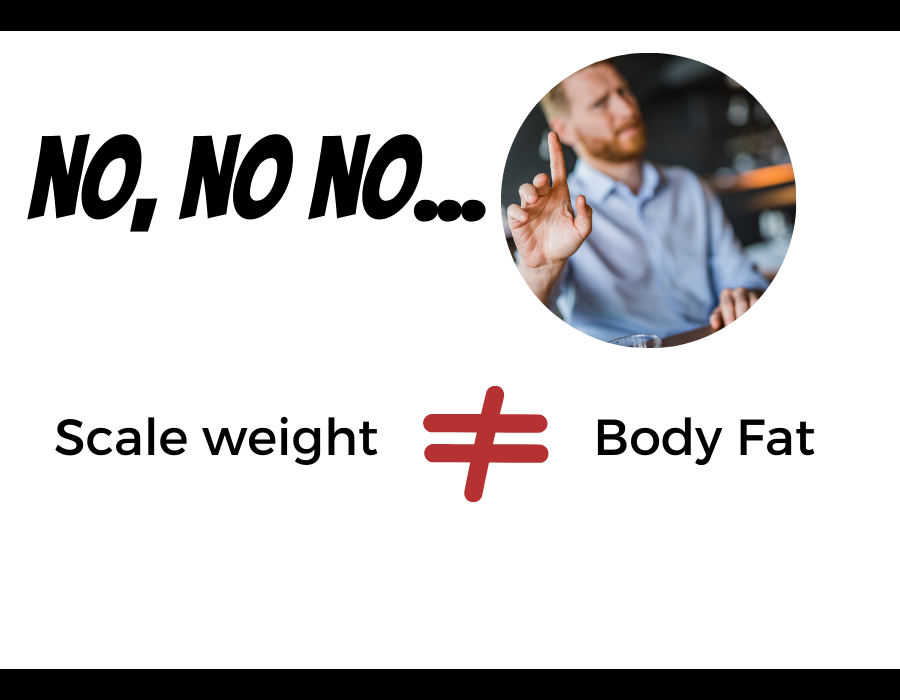
Scale weight does not equal body fat, even though they’re oftentimes used interchangeably.
The reality is the number you see when you step onto the scale includes waaaay more things than just body fat.
For example, on top of body fat, your scale weight takes into account:
- Muscle
- Water
- Bone
- Food that’s currently in your stomach, etc
So for that reason, you can’t tell how much body fat you’ve lost or gained just by looking at the number on the scale.
Here are a couple scenarios where this plays itself out:
Scenario #1
You do everything right the day prior.
You stick to your diet (and daily protein target), you get a good workout in, and you hit your daily steps goal.
But when you check the scale, it says you gained a few pounds overnight.
What’s going on?!
Did you really gain all that weight overnight?
Naaaa, the scale can be finicky.
You didn’t all of a sudden gain a whole bunch of body fat.
The number you see may have gone up but remember, your weight takes into account many factors.
Muscle, water, bone, body fat, food that’s in your stomach, etc.
Most fluctuations in weight just have to do with water retention and that’s a temporary thing.
Water retention doesn’t equal fat gain, and that’s what’s really important.
Scenario #2
You might run into a situation where you’re losing inches but not weight.
Your measurements are going down but for some reason your weight isn’t.
You know what’s cool about this scenario?
When that’s happening to you it means you’re building muscle and losing fat AT THE SAME TIME.
That, my friend, is the holy grail of fitness.
Issue #3: Muscle impacts the fat loss equation
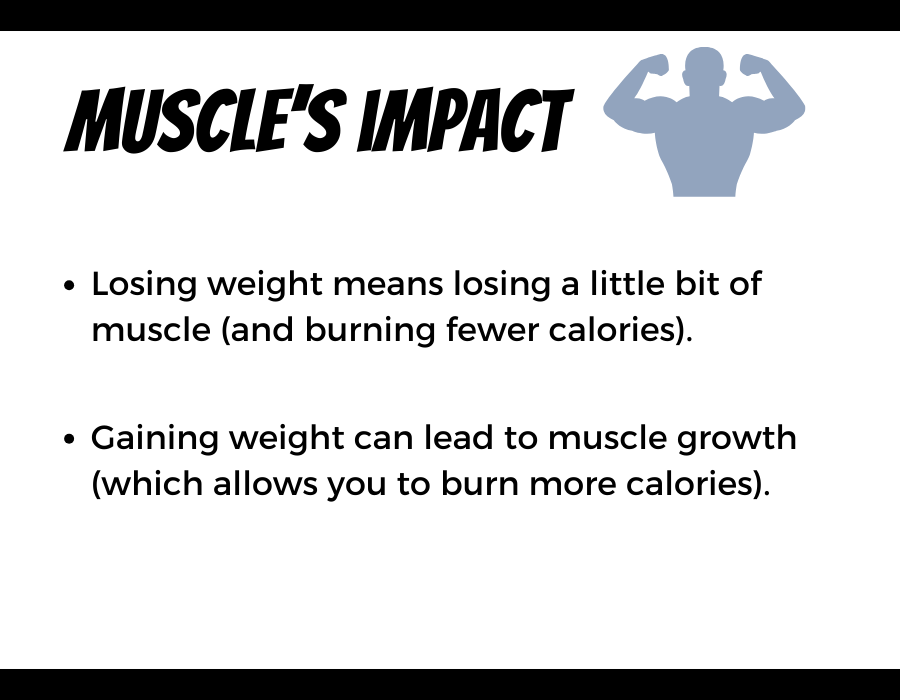
Losing weight comes with a little bit of muscle loss too.
The less muscle you have, the fewer calories you burn (I.e. your metabolic rate decreases).
Similarly, being in a calorie surplus can lead to you building muscle if you play your cards right and work hard on your strength training program.
More muscle = increased metabolism and burning more calories.
Again, this goes back to the point that body fat isn’t the only thing that gets stored.
You have to account for changes in muscle mass, which impacts your metabolic rate and causes deviations to the whole 3,500 calories in a pound of fat assumption.
Let’s say for the sake of argument the only things you have to be concerned about when it comes to your weight are muscle and body fat.
Throw everything else aside like water, bone, stomach content, etc.
If you wanted to lose exactly one pound, you’d have to eat less than you already are in a deficit to make up for the muscle you’ve lost.
And if you wanted to gain exactly one pound you’d have to eat a little bit more because of the extra muscle you have that’s burning more calories.
To sum things up, is 3,500 calories in a pound of fat just a myth?
I don’t want your takeaway to be that 3,500 calories in one pound of fat is total B.S. and that you’ve been lied to this whole time.
Is it a 100% concrete, definitive way to think about weight loss/weight gain?
Not exactly, no.
But does that mean it’s totally useless?
Most certainly not.
3,500 calories in a pound of fat can be a great tool for APPROXIMATING how many pounds you might lose or gain.
3,500 calories in one pound of fat Q&A
How many calories do I burn in a day?
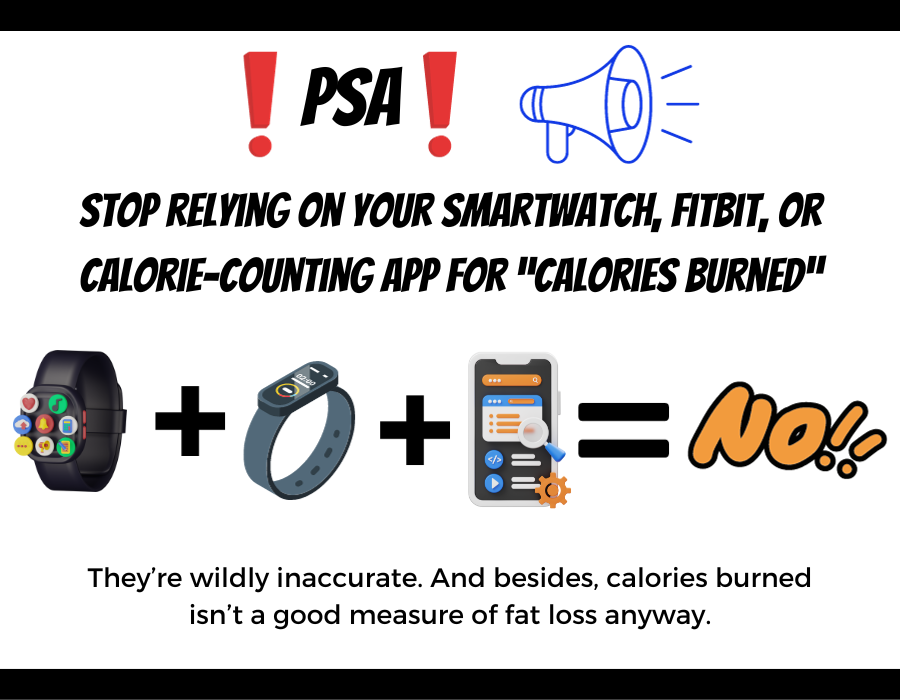
I think people get so fixated on the number of calories they burn in a day, which, in reality, there’s really no real way to calculate this accurately.
Your Fitbit, smartwatch, MyFitnessPal, or whatever electronic or app you’re using to calculate the number of calories you burn a day just isn’t accurate.
In fact, research shows they’re as much as 93% inaccurate.
There are two primary reasons for this
Reason #1…
There are so many different things that go into how many calories you, as an individual, burn each day.
Someone who works hard lifting weights in the gym and stays on top of their nutrition will have more muscle (which, again, speeds up your metabolism).
There isn’t a device or app out there that can calculate the exact amount of muscle or lean body mass you have, and thus, any calculation it spits out for number of calories burned will be drastically inaccurate.
Reason #2…
I think you’ll understand this better with an example.
Let’s say you and I plan on getting a cardio workout in (because we’re friends, right?).
We’re going to swim a few laps in the pool.
But that’s something you’re used to.
You swim a couple of times a week while I can barely swim a few laps without floaties on.
Who’d burn more calories?
All things being equal (we’re the same height, weight, have the same activity level, etc), I’d burn more calories than you, and here’s why…
Since my body isn’t used to swimming, I’d have to struggle and strain to try to keep up with you, and all that effort ends up in me burning more calories.
Your smartwatch or fitness app can’t account for something like this when calculating the number of calories you burn.
It has no idea how conditioned you are toward a specific type of exercise.

What's up?
I’m Chad, I’m happy you’re here! I’m a certified personal trainer and my goal is to help you form practical, sustainable habits that lead to lifelong fitness results. If you want to lose fat, build muscle, and live a healthier, happier life (without feeling deprived or restricted) then you’re right where you need to be. 💪🏾





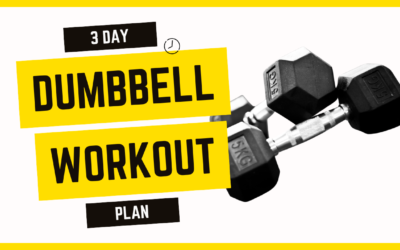
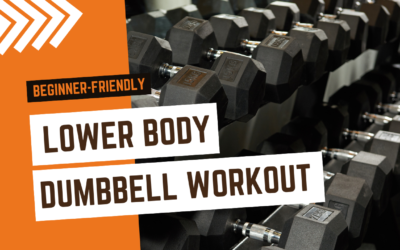
0 Comments